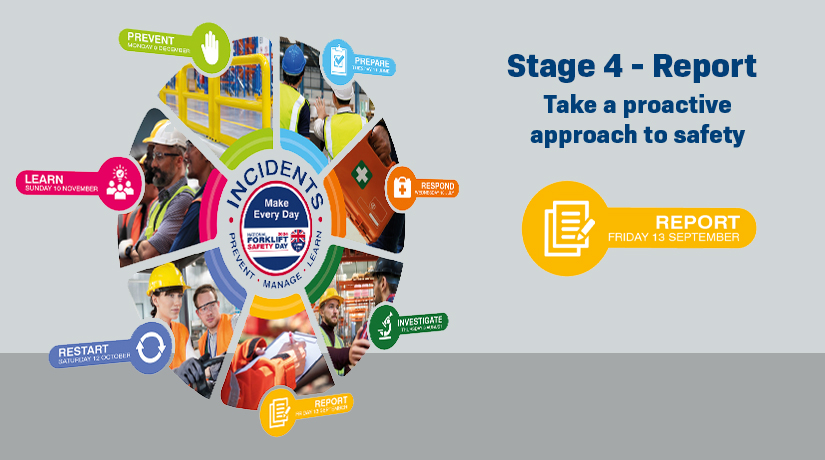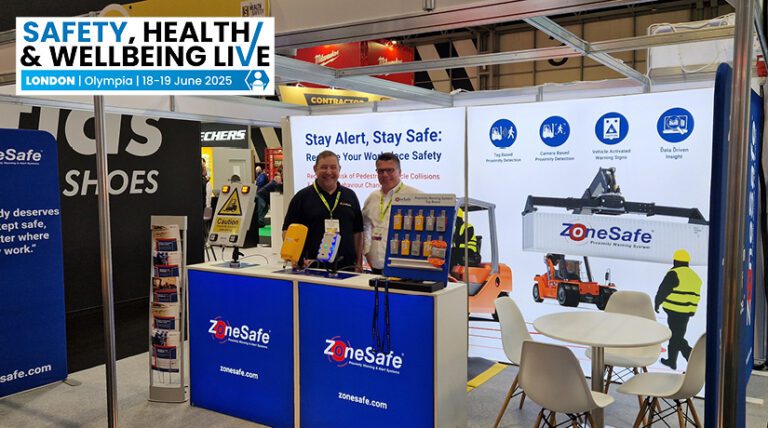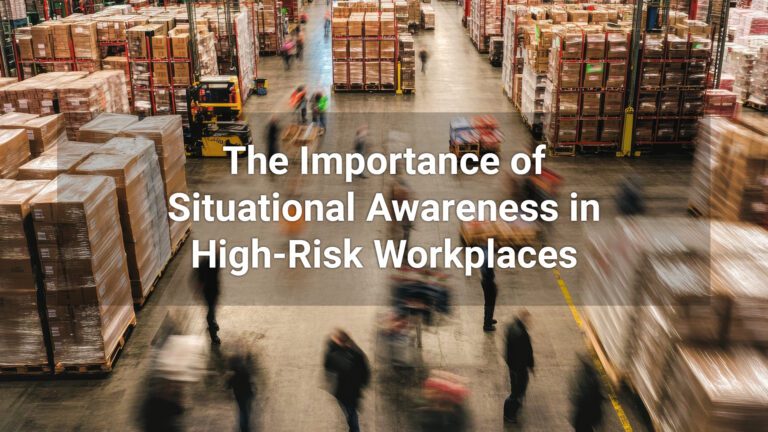The National Forklift Safety Day (NFSD) campaign launched earlier this year under the slogan ‘Prevent – Manage – Learn’. This year’s initiative will explore what actions should be taken before, during and after a forklift incident.
The extended program will focus on the 7 stages of the forklift incident cycle and the strategies for each stage will be highlighted and discussed on specific dates over a 7-month period from June – December.
September’s instalment of the programme is stage 4:
REPORT
The REPORT stage looks into the statutory obligations placed on organisations for reporting a safety incident. This stage examines RIDDOR and LOLER reporting and also covers expected follow up actions.
Serious and even fatal accidents are all too common with around 60,000 serious accidents reported each year in the UK. Forklifts are undoubtedly a vital piece of manual handling equipment for many industries, but are also involved in a high number of workplace accidents. When accidents happen, it is imperative that they are reported in line with the latest guidance and legislation. Companies that fail to report, are at increased risk of receiving fines, legal battles and reduced overall health and safety at work.
Reporting regulations
RIDDOR
The Reporting of Incidents, Diseases and Dangerous Occurrences Regulations (RIDDOR), place duty on employers to report serious and fatal accidents.
Forklift accidents that must be reported include:
Serious injuries and fatalities
Work related accidents involving a member of the public where they have had to be taken to hospital
Dangerous occurrences including failure, collapse or overturning, fire or explosion that takes equipment out of service for more than 24 hours, and contact with overhead power lines.
LOLER
The Lifting Operations and Lifting Equipment Regulations 1998 (LOLER), places obligations around safe operations on anyone who owns, operates or has control over lifting equipment including forklifts.
LOLER requires all lifting equipment to be fit for purpose, appropriate for the task, suitably marked and makes many pieces of equipment subject to periodic ‘thorough examination.’ LOLER also places a requirement for additional thorough examination following any exceptional circumstances including overload or impact with another object. If any dangerous defects are found, the inspector, known as the competent person, is legally obligated to make a report to the relevant enforcement agency such as HSE.
Reporting an incident
Employers are required to report safety breaches in the workplace – It is important that reports are accurate, detailed and clearly communicated. Accident documentation should include thorough details of what happened, when it happened and should include any contributing factors.
Accurate and legal reporting:
Notify a manager or supervisor with key details of the incident
Report the incident by completing an accident report form and logging it in the company accident book
If it is a serious incident, report it to HSE under RIDDOR through the HSE website
It is the responsibility of the employer to make the report, not the injured party or other employee.
Examination of the equipment may be required by a competent person and if a dangerous defect is found, this must be reported to the relevant enforcement agency such as HSE.
Follow up actions such as staff communication, monitoring the situation and tracking improvements are required
Having proper reporting systems in place, helps businesses to achieve a safe operation and helps them to learn from each incident. Knowledge gained from efficient reporting helps employers to identify risks, enhance safety procedures and stay compliant and up to date with legation. This protects businesses from costly legal bills, fines and reputational damage.
RESPOND with ZoneSafe
ZoneSafe is a powerful tool in accident prevention by alerting drivers and pedestrians to hazards, and raising overall situational awareness in the workplace. Taking preventative action is always the best way to protect people and businesses. But if an accident does take place, ZoneSafe also offers businesses insight by generating key data that can be used in incident reporting.
Whilst in use, ZoneSafe Proximity Warning system records real time data, that is easily downloaded from the cloud for review. This data helps to provide key information around timeframe and other crucial details from the incident to ensure reports are accurate.
Further reading – National Forklift Safety Day
Contact ZoneSafe to discuss your forklift safety concerns –




